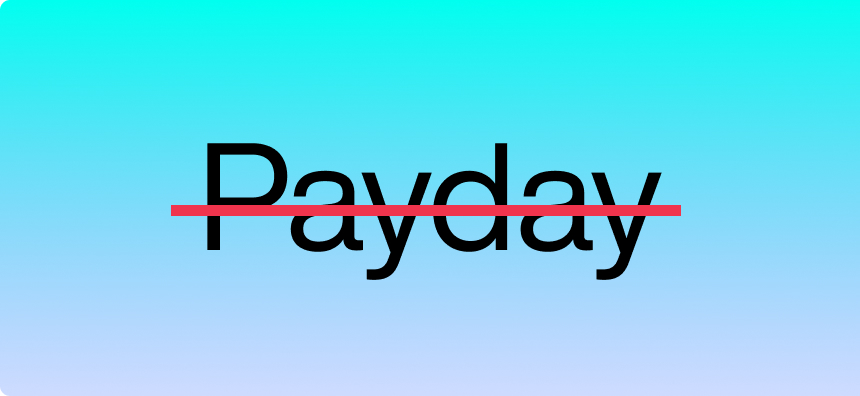Goodbye Payday: 3 Reasons Why Your Company Needs Earned Wage Access

Earned wage access (also referred to as instant pay, earned income, or earned wages) has become a powerful payroll solution over the last decade. A 2019 Visa study found that 79% of employees would be willing to switch to an employer that offers earned wage access (EWA) and that companies that offer EWA have higher employee retention rates. As more people continue to struggle with everyday finances (a Federal Reserve study found that over 40% of American adults wouldn’t be able to cover an emergency expense of $400 if one arose), EWA programs will only grow in popularity and usage.
What is Earned Wage Access?
Earned wage access is a financial service that employers can offer to their employees, allowing them to access a portion of their accrued wages before the end of the standard payroll cycle. The employee receives funds through direct deposit or via a prepaid debit card and that money is then deducted from the employees’ paycheck at the end of the payroll cycle.
It is important to distinguish earned wage access from traditional lending programs. With employer-sponsored EWA programs, employees can only access accrued wages (not future wages). In fact the Consumer Financial Protection Bureau (CFPB) recently issued two advisory notices clarifying that distinction, stating that “employer-based programs are essentially providing the employee access to his or her own money, and thus cannot be credit.”
Since first being introduced over a decade ago, thousands of companies - from small businesses to Fortune 500 companies - now offer EWA programs to their employees. Why? Here are three key benefits:
1. Offering Employees Financial Peace of Mind
It is estimated that one-third of the total U.S. workforce lives paycheck to paycheck without enough money to cover a financial emergency. Employees live with that financial stress daily and, not surprisingly, many have found that it impacts their ability to work. The Visa study found that 80% of employees spend time at work thinking about or dealing with their finances each week.
Earned wage access can help reduce this stress by giving employees more agency over their finances. By empowering employees to access accrued wages immediately (rather than at the end of a two-week pay period), they can pay off debts faster and avoid late and overdraft fees. This financial peace of mind can help them become more engaged in their work and generally more in control of their finances.
2. A Better Alternative to Payday Loans
With roughly 43% of companies operating on a bi-weekly payroll cycle, the risk of employees falling into debt between paychecks is high. This is why roughly 12 million Americans use payday loans when they need access to quick cash.
The issue with payday loans is that they often carry extremely high interest rates, ranging from 300-600% of the original loan amount! That means that if an employee misses an initial repayment, his or her debt will begin to snowball significantly.
Earned wage access is a healthier alternative to payday loans because it carries no interest or hidden fees. Employees are simply accessing the money that they’ve earned already, without having to wait two weeks for it to be deposited in their bank account.
3. Supporting Better Employee Financial Habits
EWA can also help employers support better budgeting and spending habits among their employees. With a traditional payday, employers don’t have insight into how their employees are using that money. However, with EWA, employers can see who is taking advantage of the program, how frequently, and in certain cases, how they are spending that money.
For example, businesses that leverage Highnote’s EWA solution get access to deep spending data across employees’ physical or digital cards. This data can be used by HR teams to help them understand their employees’ spending and budgeting habits or even to create specific merchant reward offers that employees will love. All of this comes back to giving employers a more central role in the financial wellness of their employees.
Bringing Earned Wage Access to Your Business
As you consider launching an EWA program at your company, it’s important to carefully think through the dynamics of the program. For instance:
- How frequently do you want your employees to be able to access their earned wages (daily, weekly)? Keep in mind that you want to give your employees quick access to their money; but you also want to ensure they are budgeting enough for their future expenses like rent or mortgage payments. You might consider putting a cap on the total percentage of a total paycheck that an employee can advance.
- Another consideration is whether you’re going to charge employees for accessing EWA or collect interchange income on transactions. There are pros and cons to this approach, depending on your overall goals.
Most importantly, take the time to carefully find and onboard an EWA provider, as running a program in house can be expensive and difficult to manage. At Highnote, our goal is to make earned wage access as simple and painless as possible, which is why we help our clients customize and quickly deploy their programs. Best of all: earned wages are distributed to employees via a physical or mobile card, giving them the added flexibility to access and use their money on the go from multiple locations.
Ready to say goodbye to two-week pay periods? Contact us to learn how Highnote can help you bring earned wage access to your company within days.